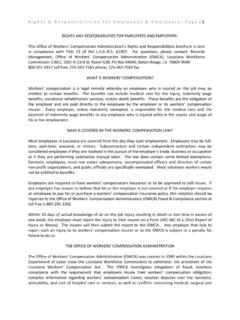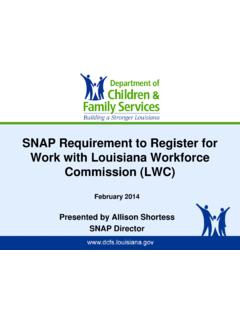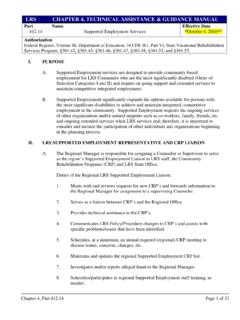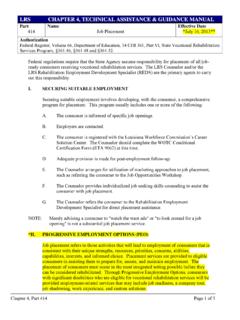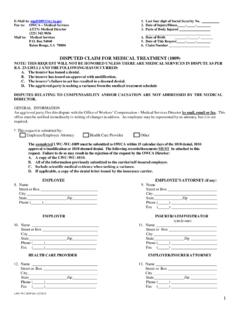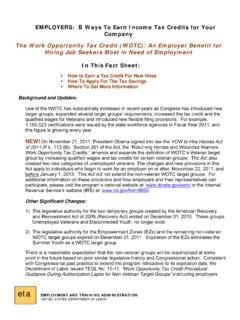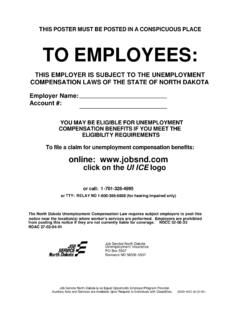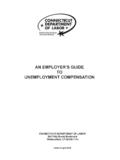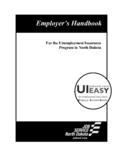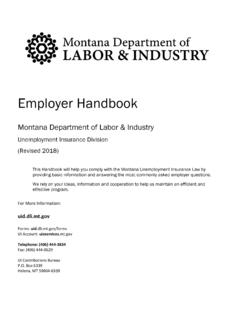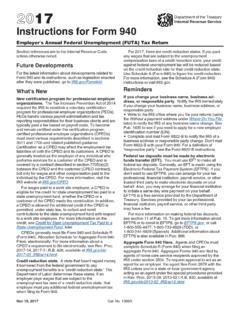Transcription of Unemployment Insurance Tax Guide for Employers
1 Unemployment Insurance Tax Guide for Employers Unemployment Insurance Tax Guide for Employers i Vision We will make Louisiana the best place in the country to get a job or grow a business, and our goal is to be the country's best workforce agency. Mission We put people to work. Values Integrity and Respect, Open Communication, Accountability, Teamwork, Continuous Improvement, Adaptability Strategy The Office of Unemployment Insurance Administration will deploy the following strategies to support the objectives of the Agency: Serve as a bridge to re-employment Make timely and quality determinations Minimize overpayments and prevent fraud Ensure complete and accurate employer wage and tax records Provide quality customer service and education to claimants and Employers Introduction Whether you are starting a new business or maintaining an existing one, this Guide will answer your questions regarding Louisiana Unemployment Insurance Tax.
2 Inside you will find information about laws, regulations and registrations with which you may be required to comply. The information supplied here is not guaranteed or intended to serve as a substitution or interpretation of applicable law. It should be used only as a general Guide for your business questions. The Guide will be updated as needed in an effort to maintain timely and accurate information. The most up-to-date version of the Guide can be downloaded on LWC s Web site at For additional information you may call or write our Unemployment Insurance Tax division at: Louisiana Workforce Commission Chief of Tax Operations Box 94186 Baton Rouge, LA 70804-9186 Phone: 1-866-783-5567 or 1-800-259-5154 (Voice & TDD) Louisiana Workforce Commission UI Tax Liability and Adjudication Box 94186 Baton Rouge, LA 70804-9186 Phone: 1-866-783-5567 or 1-800-259-5154 (Voice & TDD) Fax.
3 (225) 346-6073 Auxiliary aids and services are available upon request to individuals with disabilities. Unemployment Insurance Tax Guide for Employers ii Table of Contents Page Introduction .. i Unemployment Insurance Tax in Louisiana .. 1 Exclusions to Wage Reporting .. 2 Distinguishing Between Employees and Independent Contractors.
4 3 Tax Liability .. 5 Employees Working in More Than One State .. 6 Tax Rates .. 6 State Unemployment Tax Act (SUTA) .. 9 Professional Employer Organization (PEO) .. 9 Reporting Wages and Paying Taxes Due .. 10 Reimbursable Employers .. 11 Glossary of Terms .. 13 Links to Resources .. 16 Unemployment Insurance Tax Guide for Employers 1 What is Unemployment Insurance (UI)? UI is a program that provides temporary weekly benefits for workers who have lost their jobs through no fault of their own who are able to work, available for work, and actually seeking work in their usual occupations who have earned sufficient base period wages from covered Employers to qualify for benefits The contributions for the Unemployment Insurance program are paid by the employer, not the employee, and should not be deducted from employee wages.
5 ( 23:1531 and 23:1600) Is there a law governing UI? Yes. Louisiana Revised Statutes of 1950, Title 23, Chapter 11, covers the law and administration thereof. This law must be approved by the U. S. Secretary of Labor for Louisiana Employers to be able to receive credits against the Federal Unemployment Tax Act (FUTA). Our law must also conform to the Federal Social Security Act and FUTA requirements. A list of Louisiana Revised Statutes referenced in this Guide may be found on at: with a link to the Louisiana Legislature's web site at What is the relationship between the state UI tax and the federal Unemployment tax?
6 How are these tax monies used? The contributions that you pay under an approved state law may be taken as a credit toward the federal tax. The FUTA credit is limited to percent, and all Employers in the state receive that much credit against the federal tax if they paid UI taxes to the state. An employer can apply the factor to their contribution amount for a quarter to determine the monetary amount that will be creditable. Amounts paid in state taxes are used to pay the cost of Unemployment benefits in the state. The tax paid to the federal government pays the cost of administration and federal extended benefits.
7 In order to receive full FUTA credit for taxes paid to the state, it is necessary that state taxes be paid no later than January 31 following the calendar year in which the wages were paid. You should make certain your reports for the fourth quarter, due January 31, are filed on time. Which Employers must pay UI tax? Every employing unit operating in Louisiana is required to complete and submit an EMPLOYER APPLICATION for LA Unemployment ACCOUNT, for a determination of liability or non-liability according to the Louisiana Employment Security Law.
8 Apply online: The Louisiana Employment Security Law provides for Unemployment compensation coverage as listed below. 1. Any employing unit which pays wages of $1,500 or more during any quarter in a calendar year or has at least one individual employed during some portion of a day during 20 or more separate calendar weeks in a calendar year. 2. Any employing unit which has acquired all or part of an organization, trade, business, or the assets of an employing unit, which at the time was an employer subject to the Act. 3. Any employing unit which acquired an organization, trade, business, the employees or the assets of another employing unit, if the employment record of the predecessor prior to the date of acquisition and the employment record of the successor subsequent to the date of acquisition, both within the same year, would be sufficient to satisfy the employment requirements of No.
9 1 above. 4. Any employing unit that sold to or merged with an existing or new employing unit. Unemployment Insurance Tax Guide for Employers 2 5. Any state instrumentality, political subdivision, school (public or private), and some non-profit, religious, charitable, and educational organizations. 6. Any employer who is subject to FUTA and has at least one employee in Louisiana. 7. Any employer who pays wages of $1,000 or more in any calendar quarter of a calendar year for domestic services in a private home, local college club, or local chapter of a college fraternity or sorority.
10 8. Any employer who employs 10 or more individuals for 20 or more weeks in a calendar year or who pays $20,000 or more wages in a calendar quarter for agricultural labor in a calendar year. 9. Any inactive subject employer who has never requested or been granted termination of coverage and resumes operation within seven years after their last employment, regardless of the number of employees. 10. Any non-profit organization which has four or more employees for 20 or more weeks during a calendar year which is not subject to FUTA due to IRS exemption under Section 501(c)(3) of the Internal Revenue Code.


